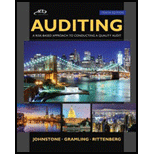
Auditing: A Risk Based-Approach to Conducting a Quality Audit
10th Edition
ISBN: 9781305080577
Author: Karla M Johnstone, Audrey A. Gramling, Larry E. Rittenberg
Publisher: South-Western College Pub
expand_more
expand_more
format_list_bulleted
Question
Chapter 3, Problem 73RSCQ
To determine
Internal Control
Internal Control is a systematic measure which helps in review, checks and balances. Internal control is a procedure placed by the management to secure the assets, promote accountability and increase efficiency.
To explain: The reason how the weaknesses in the audit committee affect the management’s valuation of internal control over financial reporting.
Expert Solution & Answer
Trending nowThis is a popular solution!

Students have asked these similar questions
I am looking for help with this general accounting question using proper accounting standards.
provide answer please
I need help finding the accurate solution to this financial accounting problem with valid methods.
Chapter 3 Solutions
Auditing: A Risk Based-Approach to Conducting a Quality Audit
Ch. 3 - Prob. 1TFQCh. 3 - Prob. 2TFQCh. 3 - Prob. 3TFQCh. 3 - Prob. 4TFQCh. 3 - Prob. 5TFQCh. 3 - The control environment is seen as the foundation...Ch. 3 - Prob. 7TFQCh. 3 - Prob. 8TFQCh. 3 - Prob. 9TFQCh. 3 - Prob. 10TFQ
Ch. 3 - Prob. 11TFQCh. 3 - Prob. 12TFQCh. 3 - Prob. 13TFQCh. 3 - Prob. 14TFQCh. 3 - Prob. 15TFQCh. 3 - Prob. 16TFQCh. 3 - Prob. 17TFQCh. 3 - Prob. 18TFQCh. 3 - Prob. 19TFQCh. 3 - Prob. 20TFQCh. 3 - Prob. 21MCQCh. 3 - Prob. 22MCQCh. 3 - What are the components of internal control per...Ch. 3 - Prob. 24MCQCh. 3 - Prob. 25MCQCh. 3 - Which one of the following components of internal...Ch. 3 - Prob. 27MCQCh. 3 - Prob. 28MCQCh. 3 - Prob. 29MCQCh. 3 - Prob. 30MCQCh. 3 - Prob. 31MCQCh. 3 - Prob. 32MCQCh. 3 - Prob. 33MCQCh. 3 - Prob. 34MCQCh. 3 - Prob. 35MCQCh. 3 - Prob. 36MCQCh. 3 - Prob. 37MCQCh. 3 - Prob. 38MCQCh. 3 - Prob. 39MCQCh. 3 - Prob. 40MCQCh. 3 - Prob. 41RSCQCh. 3 - Prob. 42RSCQCh. 3 - Prob. 43RSCQCh. 3 - Prob. 44RSCQCh. 3 - Distinguish between entity-wide and transaction...Ch. 3 - Refer to Exhibit 3.2. List the principles...Ch. 3 - Prob. 47RSCQCh. 3 - Prob. 48RSCQCh. 3 - Prob. 49RSCQCh. 3 - Prob. 50RSCQCh. 3 - Refer to Exhibit 3.3. For each risk assessment...Ch. 3 - Prob. 52RSCQCh. 3 - Prob. 53RSCQCh. 3 - Prob. 54RSCQCh. 3 - Prob. 55RSCQCh. 3 - Prob. 56RSCQCh. 3 - Prob. 57RSCQCh. 3 - Prob. 58RSCQCh. 3 - Authorization of transactions is a key control in...Ch. 3 - Prob. 60RSCQCh. 3 - Prob. 61RSCQCh. 3 - Prob. 62RSCQCh. 3 - Prob. 63RSCQCh. 3 - Prob. 64RSCQCh. 3 - Prob. 65RSCQCh. 3 - Prob. 66RSCQCh. 3 - Prob. 67RSCQCh. 3 - Prob. 68RSCQCh. 3 - Refer to Exhibit 3.9. What are the important...Ch. 3 - Refer to Exhibit 3.10 and Exhibit 3.11. Describe...Ch. 3 - Prob. 71RSCQCh. 3 - Prob. 72RSCQCh. 3 - Prob. 73RSCQCh. 3 - Prob. 74RSCQCh. 3 - Assume that management is gathering evidence as...Ch. 3 - Prob. 76RSCQCh. 3 - Prob. 77RSCQCh. 3 - Prob. 78RSCQCh. 3 - Prob. 79FFCh. 3 - Diamond Foods, Inc. (LO 8, 9) In February 2012,...
Knowledge Booster
Similar questions
- A firm sells 2,800 units of an item each year. The carrying cost per unit is $3.26 and the fixed costs per order are $74. What is the economic order quantity? (Please round units to the nearest whole number)arrow_forwardA company sold goods for $12,000 on credit and later allowed a sales return of $2,000. Calculate the net sales to be reported in the income statement and explain the reasoning behind adjusting for returns. HELParrow_forwardConversion cost per unit equals $6. Total materials costs equal $60,000. Equivalent units for materials are 12,000. How much is the total manufacturing cost per unit?arrow_forward
- Please explain the solution to this financial accounting problem with accurate explanations.arrow_forwardI need help with this general accounting problem using proper accounting guidelines.arrow_forwardDuring the year ended December 31, 2023, Ever glow Technologies Inc. earned$3,950,000 in net income after taxes. The company reported $278,000 of net unrealized gains on available-for-sale securities (net of taxes), and $190,000in foreign currency translation gains from the consolidation of its Canadian subsidiary (net of taxes). Prepare the Statement of Comprehensive Income for Ever glow Technologies Inc. for the year ended December 31, 2023. (In Table Format)arrow_forward
- Please provide the accurate answer to this financial accounting problem using appropriate methods.arrow_forwardI need help with this general accounting problem using proper accounting guidelines.arrow_forwardAt the high level of activity in August, 6,000 machine hours were run and power costs were $11,000. In February, a month of low activity, 2,500 machine hours were run and power costs amounted to $6,250. Using the high-low method, what is the estimated fixed cost element of power costs? a. $3,250 b. $4,000 c. $2,840 d. $6,600arrow_forward
arrow_back_ios
SEE MORE QUESTIONS
arrow_forward_ios
Recommended textbooks for you
 Auditing: A Risk Based-Approach (MindTap Course L...AccountingISBN:9781337619455Author:Karla M Johnstone, Audrey A. Gramling, Larry E. RittenbergPublisher:Cengage Learning
Auditing: A Risk Based-Approach (MindTap Course L...AccountingISBN:9781337619455Author:Karla M Johnstone, Audrey A. Gramling, Larry E. RittenbergPublisher:Cengage Learning Auditing: A Risk Based-Approach to Conducting a Q...AccountingISBN:9781305080577Author:Karla M Johnstone, Audrey A. Gramling, Larry E. RittenbergPublisher:South-Western College PubBusiness/Professional Ethics Directors/Executives...AccountingISBN:9781337485913Author:BROOKSPublisher:Cengage
Auditing: A Risk Based-Approach to Conducting a Q...AccountingISBN:9781305080577Author:Karla M Johnstone, Audrey A. Gramling, Larry E. RittenbergPublisher:South-Western College PubBusiness/Professional Ethics Directors/Executives...AccountingISBN:9781337485913Author:BROOKSPublisher:Cengage

Auditing: A Risk Based-Approach (MindTap Course L...
Accounting
ISBN:9781337619455
Author:Karla M Johnstone, Audrey A. Gramling, Larry E. Rittenberg
Publisher:Cengage Learning

Auditing: A Risk Based-Approach to Conducting a Q...
Accounting
ISBN:9781305080577
Author:Karla M Johnstone, Audrey A. Gramling, Larry E. Rittenberg
Publisher:South-Western College Pub

Business/Professional Ethics Directors/Executives...
Accounting
ISBN:9781337485913
Author:BROOKS
Publisher:Cengage